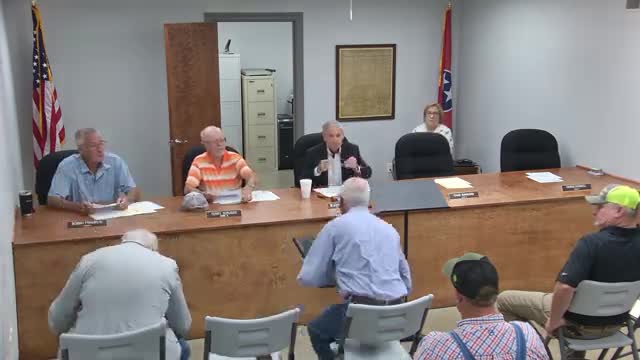Property owner tells Wilson County Road Commission stormwater is backing onto his land; commission to revisit next month
Get AI-powered insights, summaries, and transcripts
Subscribe
Summary
A Wilson County property owner told the Road Commission that blocked or missing culverts on Glade Road/Central Pike are causing chronic flooding that harms a decades-old store and hay production. Commissioners discussed rights-of-way, possible work, and agreed to revisit the issue next month; no formal repair was authorized.
An unnamed Wilson County property owner told the Wilson County Road Commission at its May 1 meeting that stormwater has been backing onto his land for years after a culvert near Glade Road and Central Pike was closed or buried, damaging a 95-year-old store and reducing hay production.
The complaint came during the commission's public-comment period, when the property owner said he filed two work orders; after a contractor he hired located the culvert with ground-penetrating radar, he said the county declined to open it. "I went out on my own dime, hired a firm out of Nashville. They came out with ground print, penetrating radar, located the culvert," he said.
The commission discussed whether the affected pipe lies within the county right of way and what the county may lawfully do there. Commissioners noted the county retains authority over work in its right of way but said opening an old culvert would not necessarily solve the broader drainage problem on private land. "We have the right to do whatever on our right of way," said Mr. Murphy, a commission member. "That doesn't mean it's gonna fix this problem or hurt the other person or fix their problem and hurt him. We don't know."
Commissioners and staff described complicating factors raised by the property owner: county-installed culverts predate a 1983 transfer of Central Pike to the state, the local geology is thin topsoil over rock causing high runoff, adjacent property owners have altered elevations and hauled fill, and removing rock or regrading would likely be expensive. The property owner told the commission that an adjacent owner bought nearby parcels and that the culvert "disappeared" after those purchases; he said water now pools in his field and at the store's site.
The commission discussed options including opening the culvert within the county right of way, asking the state to act where state road sections are involved, and coordinating with property owners to restore downstream drainage. Commissioners warned that action could prompt litigation and that their priority is safety of the county road. "If we do that before that, we ought to put people on notice by saying, we're gonna do this," one commissioner said, describing a notice process before work to reduce legal risk.
Rather than authorizing immediate repairs, the commission asked staff to continue investigating and agreed to revisit the matter at the next monthly meeting so members could consider options and, if appropriate, notify affected property owners. The commission did not approve a formal repair contract or a county-funded grading project at the May 1 meeting.
The property owner asked the commission to respond and said he might pursue other venues if the issue is not resolved. Commissioners repeatedly noted they will consider the effect on the county road network as their first priority and that work off the county right of way is the responsibility of private property owners.
The commission's discussion included repeated references to Tennessee's natural-flow drainage rule; the transcript record shows commissioners and staff saying responsibility depends on whether the pipe and outlet are within county or state jurisdiction and that some downstream obstructions appear to be fill placed by private parties. The commission asked staff to contact the state regarding the portions of the drainage system on state-maintained road segments and to bring the item back for further discussion at the next meeting.
